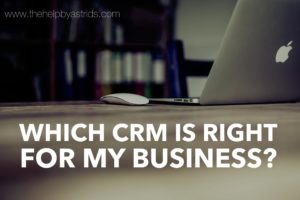 When considering a CRM for a small business, you do not need the most expensive, feature-rich, or latest CRM. What you need is a software solution that meets your needs. Start by looking at the following broad requirements:
When considering a CRM for a small business, you do not need the most expensive, feature-rich, or latest CRM. What you need is a software solution that meets your needs. Start by looking at the following broad requirements:
The Price
Price is a primary factor (if not THE main factor) when choosing a CRM. More often than not, there is more to a CRM than the upfront purchasing cost. You have to dig deeper and analyze what is included in the price. Evaluate what is included in the package. Think about:
- How much will it cost to integrate your chosen CRM into existing resources?
- Will this entail additional equipment?
- Are there hosting fees?
- How much would the training cost?
- What are the costs of upgrades?
- Does the vendor offer free support or will that be an added cost?
- Are there peripherals that need to be bought with the CRM, perhaps smartphones for the whole team?
If you have an existing CRM, also consider the costs of moving your current customer (and possibly sales) information into the new CRM. This can cost as much, if not more, than the first year’s software licensing costs. Consider how much of that customer information migration you can do yourself, and how much will need to be done by a specialist.
Fit For Purpose
There is a temptation to purchase a CRM that promises to grow your business by offering a myriad of advanced sales automation and marketing features. On paper, these CRMs look wonderful. However, it is important to avoid getting a system that does things your business does not need… or that your staff is simply not ready to adopt. It is much better to start small, with a limited set of features that match your immediate business needs. In software terms, we call this ‘fit for purpose.’ Ask yourself:
- Do you need a CRM that is more integrated into existing hardware, such as your phone systems?
- Do you need a CRM that is more social media-centric?
- What do your employees need?
- What are some of your important business processes that integrate well with the CRM?
Do not be mislead by a hundred features that you don’t understand, let alone use. Forget the bells and whistles. Choose a CRM that understands your business requirements and appropriately captures your needs. Choose a CRM that helps you make the informed choices and allows for excellent customer follow up. And more importantly, choose one that you and your team can easily work with.
Security
Never forget security. After all, customers trust you with their valuable personal information whether they are aware of that or not. A secure CRM would let you know when a team member makes changes, especially on important details such as passwords. It should let you define access controls to documents and other information for each user. Customers should be able to trust that their information and their buying preferences are not just out there on the world wide web for everyone to have access to. Privacy is important not just for you and your customers but for maintaining solid and reliable business relationships.
These are the three broad features to consider when deciding on a CRM. Next week, I’ll discuss some special features and capabilities for you to consider. Remember to stay humble and hustle hard!
Written by Jaie O.- The Help